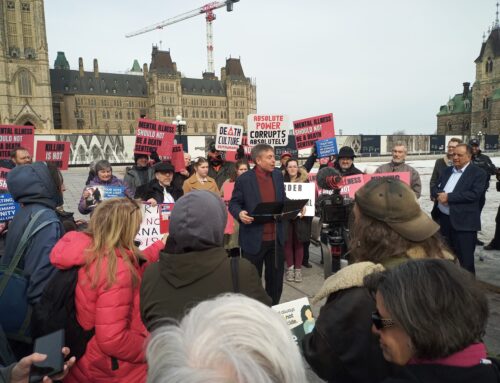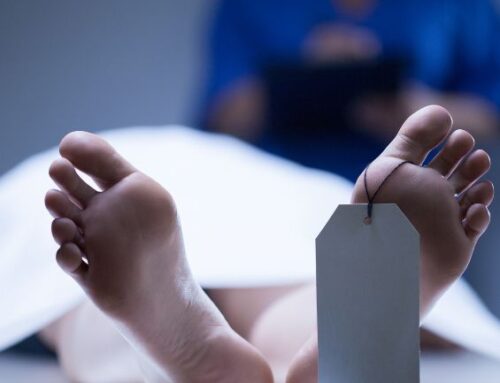Last minute change of heart saves Erwin Krickhahn
Erwin Krickhahn and John Hofess say that Krickhahn’s public suicide was called off because of the media’s dishonesty and hypocrisy; the media’s explanation is somewhat different. The following is the story, as reported in the three Toronto daily newspapers, over a period of just over a month.
October 9
The Globe and Mail publishes an opinion piece by Erwin Krickhahn. He has ALS, and says that the Supreme Court’s decision rejecting Sue Rodriguez’s request to legalize assisted suicide is an abuse of their human rights. He announces that he will have to kill himself while he is still physically able to swallow the pills. He says he will be deprived of spending a final Christmas with his daughter and granddaughter, but cannot run the risk of becoming too disabled in that time to act alone later.
“Before I die,” he writes, “I will call a press conference. I would not normally choose such a public course but it is the only way I have of making my life count for something.”
October 29
Ruth von Fuchs of the Right to Die Society has an opinion piece in the Globe. (The Globe has consistently been a media promoter of John Hofsess and the Right to Die Society. It has published features on Sue Rodriguez, and several opinion pieces by Hofsess.)
Ruth von Fuchs states that members of her organization will be present when Krickhahn commits suicide. “What the present law does say, as we understand it, is that people who are present when someone commits suicide must not assist the person with the act of suicide. Since we are not trying to flout the law, or ‘bait’ the judicial system, we will not be assisting Erwin with the actions he takes in order to end his life.”
The same day, the Toronto Star runs a sympathetic profile of Erwin Krickhahn. He reports that his neurologist told him he had ALS, which he thought was a muscle problem which would go away. Krickhahn discovered through his own research at the library that ALS is fatal.
Reporter Bruce Campion-Smith raises the question of whether witnesses to Krickhahn’s suicide could be charged with aiding and abetting the suicide.
“Counselling someone to commit suicide is a serious criminal offence,” says Sergeant Roy Watts of the Metro Toronto Police.
“To what level this counseling takes place between the witnesses and the victim is something that would have to be determined through a police investigation.”
Sergeant Watts also confirms that police would make “every effort” to prevent the suicide if they knew when and where it was taking place.
October 30
Sean Fine of the Globe, reports that Krickhahn has invited “selected members of the news media” to witness his suicide. The date is kept a secret because of fears that police will intervene and because Krickhahn’s daughter does not want to know the date.
Sean Fine reports that Krickhahn lives alone (his marriage broke up under the stress of his illness) and he has home-care visits three times a day.
This care has not given Krickhahn much optimism for the future. Nurses who visit, he says, have refused to give him his lunch, even thought it is part of their instructions.
“Feeding belongs to somebody else to do. They’re too proud to feed somebody. I had that happen quite a few times.”
He says he has also had workers who would leave his face bleeding after shaving, and, because he is alone between visits, he has been forced to sit in his own excrement for hours. His complaints to the home-care agency were dismissed, writes Fine. “He was told to spare the agency the trouble and end his life as he’s promised.”
November 2
Both the Star and the Sun report on the invitation to the media to attend the suicide.
Lou Clancy, managing editor of the Star, says he will not send a reporter. The Star is concerned about possible charges being laid.
In the Globe, Sean Fine reports on a news release from John Hofsess which states that police have been invited to attend the suicide, to “establish that no crime was intended, that no crime was committed.”
Hofsess lists the extra precautions that may be taken to ensure that the suicide is successful: a light meal or snack before taking the pills will reduce vomiting, as will travel sickness pills; alcohol will accentuate the lethal effect of the pills. Since Krickhahn cannot prepare a meal, or pour a drink, will the person who does so for him be charged, asks Fine. Hofsess states he is talking to lawyers.
Fine consults lawyer Brian Greenspan, author of a book on the Criminal Code, for insight into ‘aiding and abetting a suicide.”
Greenspan suggests that “aiding” implies “more than simply comfort.” “Abetting” means encouraging, which may pose a more serious problem to those who attend.”
“Although Mr. Krickhahn has a ‘pre-existing inclination’ to take his life, Mr. Greenspan said, he also has a goal – to get his message to the public and Parliament – and the presence of reporters could be seen as encouragement to complete the act of suicide,” reports Fine.
Providing a snack or alcohol, if its aim is to increase the comfort of the suicide, would be seen as encouraging the act, he added.
Mr. Greenspan believes that the police have a statutory duty, if present, to attempt to stop the suicide.
On the same day, the Globe publishes a letter from William A. Harshaw of Toronto. He writes of his “deep anger” over Krickhahn’s plans.
“A private act has been turned into a public spectacle, regardless of the purportedly honourable motives he sets forth for doing so…What right does Mr. Krickhahn have to impose the act of his death on the public?
“He first trivializes human death by comparing it to ‘putting down a pet’; then states that he is continuing the battle began by Sue Rodriguez last summer to die with dignity. Mr. Krickhahn’s concluding argument relates to problems he has had with personnel in the health-care system. That is not a compelling argument for the course of action he contemplates.
“…I am 50 and have had Parkinson’s disease for 13 years. My mobility becomes more constrained with each passing day. For about half of my waking hours I cannot walk unassisted if at all, and my situation is not unique. I do not despair. I have never contemplated killing myself. Nor do most men and women with complex neurological diseases.
“Articles like this one do a grave disservice to the thousands of men and women who do not let their diseases defeat them; who with little more than their own initiative to guide them surmount the obstacles their diseases place in front of them. Indeed, articles such as Sean Fine’s could give newly diagnosed patients the impression that suicide is the preferred course of action in the long term. Nothing could be farther from the truth. Courage and determination have not been tried and found wanting. They have been found difficult; and left untried.”
November 3
In the Globe, Alanna Mitchell and Sean Fine report that Krickhahn called off his suicide the previous evening.
Of the six or so media organizations invited to attend, only one – the Sun – accepted the invitation. The others waited in the apartment building’s lobby.
Ruth von Fuchs, of the Right to Die Society, told reporters, “He’s feeling put upon.” She said that Krickhahn had taken a particular dislike to one reporter in the lobby which seemed to put him off his plans.
Mitchell and Fine reported, “John Hofsess, executive director of the Right to Die Society, failed to appear with the video equipment the society wanted to use to capture the death.”
“Mr. Hofsess could not get a ride to Mr. Krickhahn’s apartment and did not know enough about how to work the equipment to just bring it to the apartment in a cab, Ms. Von Fuchs said.”
Ian Harvey, of the Sun, the only reporter actually inside Krickhahn’s apartment, reported him as saying, “I’m just going to wait a couple of days for things to settle down a bit.” Harvey interpreted this change of mind to a “stampede of media and legal questions surrounding the event.”
A Globe editorial that day called the whole thing, “A sad but pointless spectacle.” Sue Rodriguez, the editorialist pointed out, had a different way of challenging the law; she took it to court. Krickhahn’s actions “inspire a vague revulsion…a sense that our emotions are also being held hostage.”
The editorial states that the law can only be changed through the parliamentary process, a procedure that has already started. The law will not be changed any faster through Mr. Krickhahn’s “emotional blackmail.” The awfulness of his fate gives Mr. Krickhahn, like all life’s victims, enormous sympathetic power. But it does not absolve him of oral responsibility. Harsh though it may sound, the law must be judged with reference to ethical principle and social values, not the demands of particular individuals. It is just or unjust independent of how dramatically Mr. Krickhahn advertises his feelings about it. In the privacy of his conscience, Mr. Krickhahn might choose to obey or break the law he wishes changed. In this public spectacle, he mocks the law, and changes nothing.”
November 4
Globe columnist Robert Sheppard called it “a day from hell” when editors and reporters argued over how to cover the suicide. Two reporters turned down the assignment, a third reluctantly agreed to attend. Senior editors then decided the reporter should only go to the door of the apartment, and leave after obtaining an interview. Such arguments, Sheppard said, took place in news rooms all across the city.
Sheppard summed up: “The press reports other human indignities – terrorist bombings, Buddhist monks burning themselves alive in Vietnam as an act of protest. Indeed, you can argue that without the cameras and the gut-wrenching images there would not be even an attempt to resolve starvation in Africa or atrocities in Bosnia.
“But this argument doesn’t take account of the press as a collection of individuals, each with his or her own conscience.
“How are we supposed to stand by and watch someone die? As an individual, you can help someone take his own life if you believe strongly that what you are doing is right. You can attend to try to stop it. But you can’t go just to watch.
“We should have told Mr. Krickhahn that from the very beginning.”
Ian Harvey, of the Sun and the only reporter to wait in Krickhahn’s apartment, saw things slightly differently. He said that the media had twisted Krickhahn’s “simple message,” shifting the focus from suicide to the media’s role in watching. “It was a grievous injustice by my colleagues,” wrote Harvey.
Some reporters, however, had begun to suspect that this “simple message” had already been twisted by those eager to promote it.
In the Globe, Sean Fine and Alanna Mitchell wrote, “As his public campaign descends into confusion and recrimination, concerns are being raised by politicians, public-policy observers and even members of the right-to-die movement over whether Mr. Krickhahn has turned his plight into a spectacle that will in fact harm his cause.
“Other questions focus on John Hofsess, head of the Right to Die Society of Canada, who organized the protest for Mr. Krickhahn. Has he been willing to sacrifice Mr. Krickhahn’s dignity and peace of mind to make a political point?”
Fine and Mitchell discussed Krickhahn’s “obsession with the media.”
“Mr. Krickhahn spent much of what he planned to be his last day on Earth attending a packed news conference about his death. He also planned to wait until after he had seen how his story was handled on the 11 p.m. news before he took an overdose of barbiturates.” (According to Ian Harvey, in the Sun a day before, he called off his plans earlier and went to bed around 10 p.m.)
When reporters stayed in the lobby that evening, he went downstairs at one point to chat with them, concerned that they were not planning to come to his apartment.
The Globe reporters reminded readers that John Hofsess had been instrumental in bringing about publicity for Sue Rodriguez, until Ms. Rodriguez severed all ties with him after he forged her name in a letter and a statement to local newspapers.
Dr. Scott Wallace, the right to Die Society’s medical consultant, told the Globe that this incident diminished the society’s image. He said he did not believe that Krickhahn was being manipulated by Hofsess, “but I do not think the public will believe that,” he added.
November 5
The Sun’s Ian Harvey revealed that a rival organization, Dying with Dignity, had filed a complaint against John Hofsess with the Metro Toronto Police.
Helmut Lussow, a member of DWD, said that he had met with Krickhahn and did not think he had the physical ability to take the overdose by himself. He then told the police that Hofsess might help along the suicide. Police warned Hofsess that the only way to avoid charges would be not “to be in the apartment.” Hofsess added that he planned to return to British Columbia that day.
Also on November 5, a letter to the editor from Erwin Krickhahn was published by the Globe. He called the previous day’s article by Sean Fine and Alanna Mitchell “offensive garbage,” full of prejudices against himself and John Hofsess. “He has never failed me,” wrote Krickhahn. “I can say no more except to say that this kind of untrue and inaccurate story is precisely what has driven me away from any further contact with the Canadian media.”
While Erwin Krickhahn was no longer seeking the media, the newspapers were still talking about him, and John Hofsess was still publishing his version of what happened.
November 6
Both the Globe’s managing editor and the Star’s ombudsman explained their newspapers’ positions.
John Cruickshank of the Globe wrote, “The fact that Mr. Krickhahn’s gesture was a legitimate subject for news and that in our absence we would have to rely for news on Mr. Krickhahn’s supporters –a group committed to the legalization of assisted suicide – argued strongly that we should be present.
“But in the final analysis, weightier concerns tipped the balance. We came to the conclusion that we could not be with Mr. Krickhahn without becoming part of the political event he was choreographing. Rather than reporting the news, we were in danger of playing a role in it.”
Don Sellar, the Star’s ombudsman, wrote that the Star’s lawyers advised that reporters present could be exposed to criminal charges, and that the paper’s policy is not to commit a crime to get a story. He summed up, “From this corner, it would have been an immoral assignment that added nothing of substance to public debate over a legitimate issue.”
“Turning a suicide into a public circus is hardly responsible for one more good reason: such media voyeurism had the potential to endanger vulnerable people who are looking for an excuse to kill themselves.”
John Hofsess got the final word, in yet another opinion piece published by the Globe.
Hofsess blames the Canadian media’s “frenzied manner” as reasons for NBC and CNN backing away from covering the story. (Canadian reporters were calling NBC to find out when they were due to arrive.) Erwin Krickhahn wanted the media coverage, but he did not want advance coverage, to spare his daughter’s feelings. However, reporters have deadlines to meet and naturally enough were stationed in his apartment building’s lobby to file their reports once they had the information they needed.
But Erwin Krickhahn felt “betrayed” says Hofsess, because standing in the lobby was not what he wanted: he wanted them in his apartment watching him die.
Hofsess states that he did not fail to show up at the apartment on the night of the proposed suicide because he could not get a ride. He says he did not go because Krickhahn called him and told him not to be there. (Whether this was before or after Krickhahn had decided to postpone his death, Hofsess does not say.)
Finally, Hofsess writes of his “pain” in leaving Krickhahn.
“’This is the last time we’ll see one another,’ Erwin said on Thursday afternoon last week. We clasped hands in silence, transfixed by the sorrow of parting forever and being forced (italics in the original) apart. ‘They won’t let me die with my friends,’ he said.”
Earlier in this saga, Ruth von Fuchs wrote that John Hofsess stated that the Right to Die Society would not “abandon” Erwin Krickhahn, “but will be with him to the end.” Cynics may wish to add “to the end of media coverage.”




